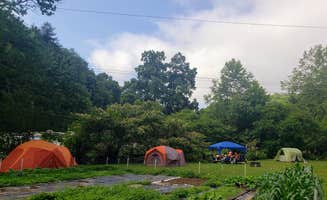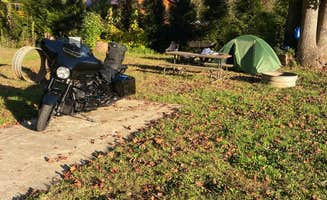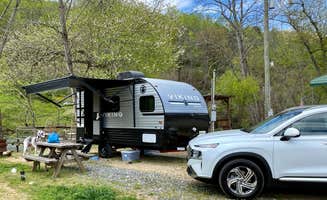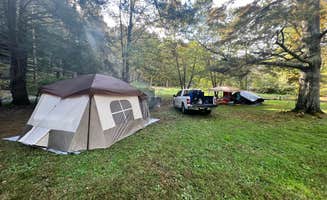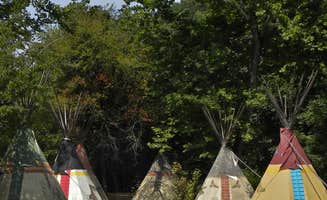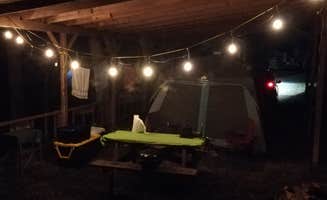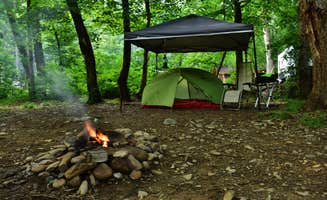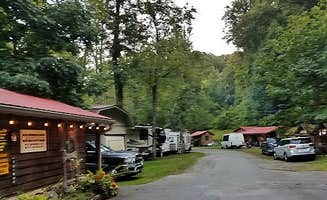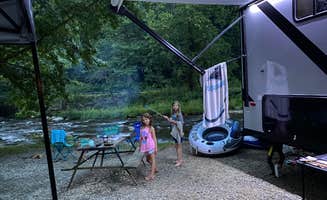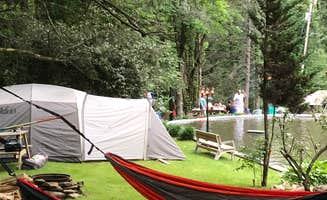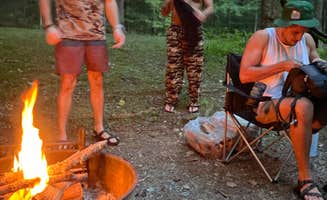Camping options near Whittier, North Carolina concentrate primarily in the 2,000-3,000 foot elevation range, creating a moderate climate zone between the lower valleys and higher peaks of the Smoky Mountains. Temperature variations typically range 10-15 degrees cooler than surrounding lowland areas, with summer highs rarely exceeding 85°F even during July and August. Most campgrounds in Whittier NC maintain operations from April through October, with limited winter camping available at privately-owned facilities.
What to do
Tubing the streams: 15-20 minute floats: At Deep Creek Tube Center & Campground, visitors can enjoy short creek floats right through the property. "You can put in your tube at one side of campground and float to end of tent sites to get out (15-20 minutes total float) or drive up the road a bit to Smoky Mountain Deep Creek entrance for a longer run of about 2-3 hours and end up back in camp," notes one camper.
Horseback riding: guided trail access: Smokemont Campground offers horseback riding excursions through nearby trails. "You can go on a horseback ride through the trails here," mentions a visitor who appreciated the activity options. Trail rides generally last 1-2 hours and are suitable for beginners.
Fishing: trout streams and stocked ponds: Kirkland Creek Campground features a dedicated trout pond on the property. "Trout fishing pond on the property if you're hungry for a fresh caught meal," reports one visitor. Fishing licenses are required for ages 16+ and can be purchased at some campgrounds or in Cherokee.
Historic structures: cabin exploration: Within a 30-minute drive of Whittier, Cades Cove offers historical buildings for exploration. "Go on the car tour loop and make sure to stop and look at the cabins and church. History at its finest," recommends a camper who enjoyed the cultural experience.
What campers like
Creek-side sites: natural sound barrier: Indian Creek Campground receives high marks for its water-adjacent sites. "Our site was very spacious right on the creek. The cleanest bathrooms I have seen at a campground," reports one visitor. The running water creates natural white noise that helps mask sounds from neighboring campsites.
Private bathroom facilities: individual shower rooms: Greenbrier Campground offers upgraded bathroom facilities that campers consistently praise. "The bath house, there are several private doors leading to your own 3 piece bath with shelving and granite counters with outlets, and a stunning double shower," explains a camper who appreciated the privacy and cleanliness.
Mountain elevation: natural air conditioning: Balsam Mountain Campground sits at over 5,000 feet elevation, providing natural cooling. "This time of year (end of July/beginning of August), the temps up there never get above 70 or 75, and the lows were in the low 50's," notes a visitor who enjoyed the refreshing mountain air when lower elevations were much hotter.
Wildlife viewing: elk sightings: Smokemont Campground offers opportunities to see larger wildlife. "We had elk walk through one morning," reports a camper who appreciated this unexpected wildlife encounter. Best viewing times are typically dawn and dusk.
What you should know
Winter operation limitations: seasonal closures: Most national park campgrounds in the area close between November and March. "We stayed for one night, on a weeknight in early December. The campground was completely deserted (one other camper came in the evening, there were only two of us there!). Most of the campground is shut down during that time," explains a visitor to Smokemont Campground.
Smoke accumulation: campfire considerations: Some campgrounds can trap smoke due to their topography. "If you're sensitive to smoke, avoid this one. The loop is in sort of a bowl and without wind all of the smoke from all the fires just sits there. I ended up wearing a mask most of one evening," warns one Smokemont visitor.
Site spacing: proximity awareness: Cherokee-Great Smokies KOA and other established campgrounds often place sites close together. "The tent sites are located near the road (I will never understand why campsites do this, since we are the ones with no soundproofing)," notes a tent camper, highlighting how site selection impacts experience.
Road conditions: challenging access: Some campgrounds require navigating difficult roads. "If you venture further onto Heintooga Rd, be warned that it's 14 miles one-way, unimproved, and can be very rutted and hard on low clearance vehicles. A beautiful little drive, just not a smooth one," advises a Balsam Mountain visitor.
Tips for camping with families
Activity variety: multiple recreation options: Elkmont Campground provides diverse activities for families. "Great location with easy access to Gatlinburg but secluded as well. The campground is beautiful with rivers running through it," shares a visitor who appreciated the balance of nature and accessibility to town.
Playground access: energy-burning opportunities: Deep Creek Tube Center & Campground offers dedicated children's areas. "Plenty for the kids to do, including gem mining, feeding goats and several playgrounds," notes a family who found the amenities helpful for keeping children engaged.
Swimming options: natural water features: Several campgrounds feature natural swimming areas. "This was a great family campground. The swimming hole was a blessing durning the hot days! (Think ice bucket challenge)," remarks a visitor to Greenbrier Campground, highlighting the refreshing but chilly mountain water.
Pet regulations: leash requirements: For families bringing pets, understanding rules is important. "Your furry family members are also welcome at this campground! They are required to be on a leash or long tie-out at all times for their safety," explains a Balsam Mountain visitor, while noting pets aren't allowed on most trails in the national park.
Tips from RVers
Site layout challenges: unusual parking configurations: Balsam Mountain Campground has unique site arrangements that RVers should know about. "The thing about Deep Creek Campground is that it's pretty unusual. Although sites say they are for tents or RVs, some are very odd and only have parking space for an RV on the road, and your table and other areas are above or below," explains an RV camper.
Leveling requirements: uneven surfaces: Preparation for uneven sites is essential at many Whittier area campgrounds. "And bring levelers; you will need them!" advises an RV camper about Deep Creek Campground. Most sites require at least minor leveling, with some requiring significant adjustment.
Site selection strategies: pre-visit scouting: When possible, checking out sites before reserving can significantly improve the camping experience. "Drive through and select your site before paying to get a nice spot," recommends a visitor to Deep Creek Campground within Great Smoky Mountains National Park.
Generator policies: noise and time restrictions: Different campgrounds have varying policies on generator usage. "Be aware that generators are allowed (60 dB max) to be run from 8 AM to 8 PM," notes a Balsam Mountain visitor, information particularly relevant for RVers who rely on power for essential systems.


